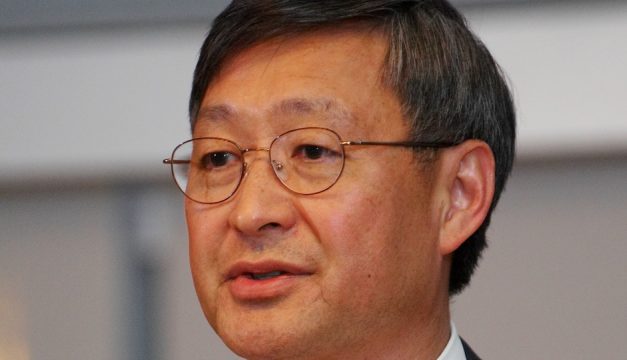Former Temple Provost Fires Back Over Allegations of Mismanagement, Harassment

Courtesy Douglas A. Lockard
A day after Temple University’s Board of Trustees announced its intention to fire President Neil Theobald, former provost Hai-Lung Dai, who was abruptly removed from his position by Theobald late last month, said publicly that his removal was unjust.
In two statements released by his lawyer, Dai said that he wasn’t aware until March that the university had run up a $22 million deficit on its financial-aid budget, and that accusations that he had retaliated against a subordinate, characterized as “sexual harassment allegations” in a statement by the Board of Trustees, were “complete and utter fabrications.” Dai acknowledged an internal investigation into a complaint against him by a subordinate who he had disciplined, but said the accusation was of retaliation and not sexual harassment.
In late June, on the same day that Temple acknowledged the $22 million financial-aid deficit, Theobald announced in a curt email to Temple employees that Dai had been removed from his position as provost. In another email to lawyers and human-resources officials earlier this week, a copy of which was obtained by Philadelphia magazine, Theobald appeared to be resisting pressure to resign from the presidency. He also stated his objection to Dai being placed in any administrative position, citing “sexual harassment” allegations against the former provost.
On Tuesday, Temple’s Board of Trustees announced that it had taken a vote of no confidence in Theobald and intends to seek his dismissal in a special meeting next week. The board acknowledged the allegations against Dai, and said that a committee would be appointed to investigate them.
But the board said that the harassment allegations were unrelated to his removal as provost, and that Theobald was ultimately responsible for the deficit in the financial-aid budget.
“As the Board of Trustees said yesterday, the responsibility for managing budgetary matters rests with the President,” Dai said in a statement. “I was never, at any time prior to March of 2016, asked by President Theobald to manage this issue. Once this issue was brought to my attention in March of this year and prior to my unjust dismissal, I actively began to take steps to address the over-expenditure.”
In a separate statement, Dai said the allegations against him had been misconstrued.
“The accusation of misconduct that has been made against me is alleged to have occurred over 6 years ago, and is alleged to have been of a verbal nature,” Dai wrote. “My accuser never complained of any inappropriate conduct by me until well after I had disciplined her as part of a well-documented corrective process. Those corrective measures were taken in consultation with Temple’s department of human resources and its legal counsel. Each of these allegations are completely frivolous.”
Dai’s lawyer, Patricia Pierce, said in a statement that the allegations against Dai should have remained confidential pursuant to university policy.
Theobald did not respond to a request for comment.
Theobald’s decision to remove Dai as provost had angered some Temple faculty prior to the announcement that Theobald would be fired. In an editorial in the Temple Faculty Herald, professor Paul Lafollette wrote that Theobald’s handling of the decision was disrespectful to Dai, the faculty, and the university. In the same issue of the Herald, Tricia Jones, a former president of the faculty senate, acknowledged that Theobald had spoken with faculty about removing Dai as provost, but wrote that the sudden announcement that Dai had been removed was harmful to the faculty as a whole.
“What did it gain Temple to air these decisions in this way?” Jones wrote. “What did it cost us? We may have different perceptions of that, but it is difficult for me to see why we needed to go in this direction or to see how the gain could outweigh the costs.”
On Tuesday, the board said that it had lost confidence in Theobald partly because of the way he handled removing Dai as provost. The board also said it holds Theobald responsible for the financial-aid deficit.
On Wednesday, Art Hochner, the president of the faculty union, the Temple Association of University Professionals, said he was concerned by the board’s sudden decision to dismiss Theobald.
“I was disappointed that this decision was made by the Board of Trustees without any opportunity to have faculty voices included in the process,” Hochner wrote in an email to faculty members. “Though TAUP has at times had differences with both former President Theobald and former Provost Dai, our primary interest is for Temple to remain a high quality institution of higher education. It is worrisome that such actions that could potentially have a huge effect on the university were apparently taken without input from faculty.”
Michael Sachs, the president of Temple’s faculty senate, said that Theobald’s ouster had come as a surprise to faculty, and raised questions about whether board members were unhappy about other aspects of Theobald’s presidency.
“You would think that there was probably more going on than just this issue, but it may be that this was significant enough for them that they needed to take action,” Sachs said.
Board members were either unavailable or unwilling to discuss the matter on Wednesday. On Tuesday, the board approved the appointment of JoAnne Epps, the dean of Temple’s law school, as provost. The board also announced Tuesday night that Richard Englert would serve as interim president while the trustees search for a new permanent president. Englert previously served as interim president in 2012.
Dai remains a tenured professor in the chemistry department.
Follow @jaredbrey on Twitter.


